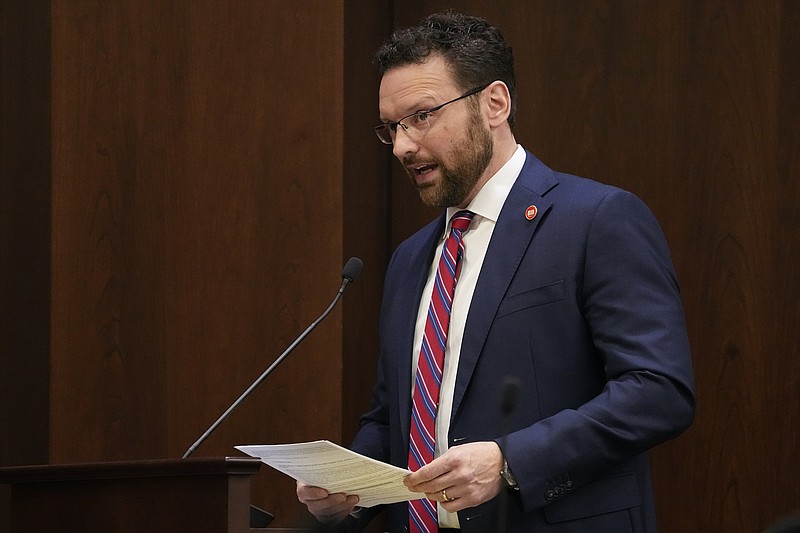A bill that would restrict big banks and insurers from denying a client service for religious, environmental and other political or cultural reasons awaits the approval of Tennessee Gov. Bill Lee after clearing the state General Assembly on Monday.
Influential conservative Christian legal groups have backed what they call a landmark bill, and describe the specter of "debanking" as modern day redlining, in reference to the history of U.S. banks declining to issues home loans in predominantly Black neighborhoods.
But the bill's critics, including representatives of the Tennessee Banking Association, say there is no evidence banks discriminate against clients because of their religion — the main reason advocates say the law is necessary — and argue the proposal would place unwieldy restrictions on financial institutions, expose them to frivolous lawsuits and force them to work with unsavory clients.
The bill was amended after its introduction to apply only to the nation's largest banks — a list which doesn't include any Tennessee chartered banks — and to exclude loans from its purview.
In the Monday vote of the state Senate, the body's 27 Republican lawmakers voted in favor of the bill — including Chattanooga area state senators Todd Gardenhire and Bo Watson — and its six Democrats voted against it.
Conservatives in Tennessee and beyond have accused financial institutions, among others in corporate America, of taking liberal stances on political and cultural issues, and they have marshaled the force of government to push back.
In December, Tennessee Attorney General Jonathan Skrmetti sued BlackRock, charging the investment giant is harming consumers by being socially conscious. And for two years, the Tennessee treasurer has been restricted from working with state banks that have pledged not to finance fossil fuels, a key driver of climate change.
National conservative groups like Alliance Defending Freedom have also launched a campaign against what they call debanking, in which financial institutions deny service to clients for political or social reasons.
In a news release touting the passage of the Tennessee bill, House Bill 2100, the legal advocacy group said it offered an example of this practice, describing the experience of the Tennessee-based nonprofit Indigenous Advance Ministries, which in April 2023 had its longtime accounts with Bank of America canceled.
In a February interview with the Chattanooga Times Free Press, Matt Sharp, of Alliance Defending Freedom, said it remained unclear why the accounts were canceled. But he said the bank failed to give a clear answer, and the suspicion that religion was the underlying reason led Indigenous Advance Ministries to file a consumer complaint with the attorney general this past summer, which generated a flurry of news coverage.
Bill Haldin, a spokesperson for Bank of America, said religious beliefs are not a factor in any account closing decision.
"In fact," Haldin said by phone Monday, "we're proud to provide banking services to nonprofit organizations affiliated with diverse faith communities throughout the United States."
He added, "Our U.S. division that serves small businesses doesn't offer banking services to organizations that provide debt collection services for a variety of risk related considerations and doesn't serve small businesses operating outside the United States."
The bill's sponsor, Rep. Jason Zachary, R-Knoxville did not respond to an interview request Monday. But asked why the bill was necessary when presenting it to colleagues March 18, he told the story of Indigenous Advance Ministries.
The nonprofit, he said, was not informed as to the reasons why its bank account was canceled until a British media outlet contacted the bank, which provided the debt collection rationale.
Before his colleagues last week, Zachary suggested this explanation by the bank did not stand up to scrutiny. The nonprofit, he said, "does not have a collection entity in Uganda."
This statement, however, appears to contradict Indigenous Advance Ministries' own description of its services.
"Our business is dedicated to pursuing the recovery of overdue invoices on behalf of our clients," says a page on the nonprofit's website describing the services offered by its Africa-based Indigenous Advance Customer Care Center.
That center, the website says, offers "jobs and business training for young men and women to acquire marketable skills, a sound work ethic, integrity, character and Christian values."
Uganda is the only African country the nonprofit mentions in the program accomplishments listed in its most recently available tax filings.
Contact Andrew Schwartz at aschwartz@timesfreepress.com or 423-757-6431.
